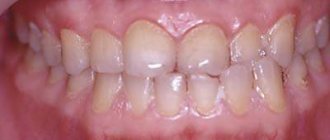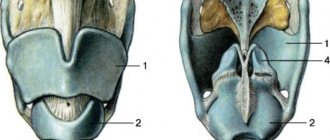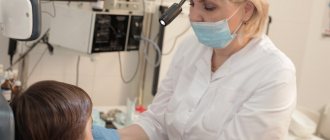Otolaryngologist for adults and children
Manevich
Igor Semenovich
Experience 27 years
Otorhinolaryngologist of the highest category, member of the European Rhinologic Society
Make an appointment
With inflammation of the laryngeal mucosa, laryngitis and concomitant diseases with sputum production often develop, so many patients wonder what it is, what are the causes, signs and symptoms of the disease, how to diagnose and how to treat to avoid complications. The occurrence of laryngitis can be triggered by viral, bacterial or fungal pathogens. The disease is of infectious origin through airborne droplets, contact, or to the fetus in the womb during pregnancy. Forms of laryngitis in adults caused by allergens or occupational activities are not contagious.
Introductory information
Laryngitis is an inflammatory process of the larynx with sputum production, which is promoted by various pathogens. Both adults and children of different age groups are susceptible to the occurrence of a pathological condition, especially children with weakened immunity and concomitant diseases. In most cases, the disease proceeds without significant complications; the process of complete recovery occurs in 7-10 days.
The acute form can develop due to respiratory infections, acute respiratory viral infections, influenza, and adenovirus infection. It can also occur as a concomitant factor in measles, diphtheria, tuberculosis and whooping cough.
Classification of pathologies of the upper respiratory tract:
- acute laryngitis manifests itself as a separate or concomitant pathology, the main signs are the primary manifestation and the effectiveness of therapy, after which after two weeks there are no consequences or complications for the body;
- the chronic form can occur due to untreated pathology and inflammation in the larynx and upper respiratory tract. It is characterized by the production of sputum. The key factors of the pathological condition are smoking, which increases the volume of sputum, and the ligaments being under constant strain.
In the absence of timely treatment of laryngitis in adults, the pathological condition turns into a chronic form and contributes to certain complications. Mostly they are associated with respiratory problems, since the larynx is an organ of the respiratory system. The main complications include:
- bronchitis;
- loss of sonority and beauty of the voice;
- false croup - mainly occurs in children. Inflammation contributes to whistling and asthma attacks;
- airway obstruction;
- mediastinitis - inflammation quickly occurs in the space between parts of the adult’s larynx, which often ends in death;
- laryngeal paresis – dangerous due to respiratory dysfunction;
- phlegmon of the neck is an acute purulent inflammation that affects the upper respiratory tract. It develops in the absence of therapeutic measures and is an indication for surgical intervention.
Recommendations for the occurrence of pharyngitis in adults and children
Soreness and dryness, as the first symptoms of an acute inflammatory process, can be alleviated:
- drinking plenty of warm liquids;
- rinsing with saline solutions or antiseptics;
- using painkillers in the form of lozenges;
- active humidification of the air in the room.
Uncomplicated acute pharyngitis does not always require medical intervention. With the right approach, you can independently cope with the symptoms and achieve a full recovery. But the absolute criterion for visiting a doctor, especially when treating pharyngitis in children, is the appearance of respiratory problems.
If inflammatory symptoms do not subside within 48 hours, and after starting active therapy you notice an increase in pain, you should also contact an otolaryngologist. If intensive treatment measures are not taken in a timely manner, the risk of developing serious complications increases. Inflammation of the trachea, middle ear or bronchial tree, as well as purulent abscesses on the tonsils or in the retropharyngeal space will require surgical intervention.
Symptoms and causes
In order to clearly understand the causes of laryngitis in adults and children, it is necessary to determine the pathologies that occur in the larynx and upper respiratory tract during the disease process. The muscles and cartilages of the larynx are covered by the vocal cords, which, when closed correctly, move smoothly and allow air to pass through, which contributes to the production of sound.
Laryngitis is an inflammation of the mucous membrane of the throat - the vocal cords. As a result of edema, the mechanism of ligament closure is disrupted, the lumen narrows, and the amount of sputum increases, which can lead to suffocation and other complications.
Let's look at the typical causes of laryngitis:
- allergic reactions that appear as a result of various irritants and are characterized by regularity in the presence of irritating factors;
- infectious agents;
- prolonged inhalation of frosty or hot air;
- the causes may be injuries to the throat and related organs in adults;
- a common cause is regular overstrain of the vocal cords;
- with laryngitis, further development of the pathology is facilitated by inhalation of polluted air, as a result of which sputum production increases.
The problem appears in the respiratory tract due to various external and internal factors. To determine treatment tactics and select appropriate medications to eliminate the causes of laryngitis, the doctor must identify clear causes and symptoms, and the patient’s complaints. Only competent elimination of characteristic causes and individual manifestations will allow choosing effective treatment methods for quick relief from the symptoms of pathology without complications and complete recovery.
The classic symptoms of inflammation are characterized by signs that can be easily identified not only by the doctor, but also by the patient himself, since such processes in the larynx have some distinctive characteristics. Main symptoms of laryngitis:
- disturbances in vocal activity are the primary signs of laryngitis. The vocal cords are characterized by being in an inflamed state, swollen, and the voice becomes hoarse. Painful sensations worsen when trying to speak loudly or scream;
- With laryngitis, narrowing of the larynx contributes to breathing problems. Therefore, this symptom of laryngitis with difficulty breathing often develops into false croup with severe complications;
- accompanying symptoms of laryngitis in adults are general poor health, loss of appetite, low-grade fever and chills;
- headache.
The main symptoms by which the diagnosis is made are signs from the first two categories, the rest are accompanying only to confirm the disease.
The key manifestations of the causes of laryngitis are a feeling of dryness in the throat, soreness and burning, tingling and other unpleasant sensations in the throat. Such conditions are also typical when the patient suffers from ARVI or influenza, but in this case they are more pronounced. The patient may also have a feeling of the presence of a foreign object in the larynx and pain. A common symptom of laryngitis is a dry cough, which turns into a wet cough with the release of a large amount of sputum. Basically, infectious causes of laryngitis lead to this course of the disease.
Laryngitis is characterized by low-grade fever and fatigue. The voice of patients with laryngitis may become hoarse, hoarse, or disappear completely. Depending on the causes of the pathology, at high temperatures and other signs of complications, it is necessary to take timely therapeutic measures aimed at comprehensively combating the pathological disease of the respiratory tract.
How does laryngitis occur in children?
In young children with laryngitis, pronounced swelling of the vocal folds and loose tissue of the subvocal space very quickly develops. This leads to a progressive narrowing of the lumen of the larynx. This condition is called acute laryngeal stenosis or false croup. Therefore, in children, the first symptom of laryngitis may be shortness of breath, accompanied by a feeling of fear and motor restlessness. Breathing may be wheezing.
The child is also bothered by a frequent dry, hysterical cough, which does not bring relief and even often worsens respiratory failure. Pallor of the skin, blueness (cyanosis) of the lips and nasolabial triangle appear. Severe respiratory failure can provoke the development of convulsive syndrome if the child previously had perinatal or later brain damage.
Diagnosis of the disease: how it goes, what procedures are performed
To diagnose pathology of the upper respiratory tract, it is necessary to examine the throat by a qualified otolaryngologist, who takes an anamnesis, prescribes tests, laryngoscopy or a biopsy of the affected area of the larynx.
The pathology is diagnosed during the initial examination, then to confirm the diagnosis it is necessary to take laboratory and biochemical blood tests, and you can also do an ultrasound scan to see the presence of sputum in the larynx and upper respiratory tract. When taking blood, a bright red hue of the blood indicates insufficient coagulation and the occurrence of inflammatory processes in the body. Often, in the presence of inflammation, the pathological condition is diagnosed using a biopsy in order to select appropriate antibiotics.
If there is difficulty breathing or pain in the upper respiratory tract, the patient should be immediately checked by a qualified doctor. In the presence of minor symptoms and manifestations on the laryngeal mucosa, patients often confuse the pathology with ordinary shortness of breath or a cold. In such conditions, carrying out routine diagnostics and examination is very difficult; it is necessary to check the current state of the larynx using a modern method - laryngoscopy.
This diagnostic method is carried out using a laryngoscope and allows the doctor to deeply examine the larynx by viewing through a backlit mirror. This diagnostic method is used to identify swelling of the throat mucosa and the location of blood vessels. Basically, in adults with laryngitis, the following signs are revealed: overflow of blood vessels, and overflow of the throat mucosa with sputum, bilateral pathology in advanced cases. Laryngoscopy allows the doctor to make an unambiguous diagnosis; this condition can be cured with properly selected medications.
To determine the severity of the disease with laryngitis, examinations are prescribed using radiography or computed tomography of the larynx, endofibrolaryngotracheoscopic method. These methods are not basic and are prescribed only if there are prerequisites and indications. In some situations, differential diagnosis is necessary to exclude oncology of the upper respiratory tract and laryngeal tuberculosis.
Diagnosis of laryngitis
To diagnose laryngitis, a physical examination and a complete medical history are performed. It is necessary to examine in detail the condition of the patient’s vocal cords and the sound of the voice. In cases where there are no obvious reasons for the development of voice problems and dysphonia, the patient is referred to an appointment with an otolaryngologist. During the examination, special attention is paid to the external state of the contours of the neck and larynx of a patient diagnosed with chronic laryngitis, the skeleton of the larynx is palpated for its mobility during swallowing, and the participation of the cervical muscle during phonation is analyzed. If phonation is tense, then the tense state of the external neck muscles will be clearly visible. During the examination, special attention is paid to the assessment of regional lymph nodes, since their enlargement may indicate a precancerous process. Determining the size of the thyroid gland is of particular importance for patients with chronic edematous polyposis laryngitis. As part of the assessment of voice function, not only the quality of articulation is assessed, but also the individual characteristics of speech.
In order to fully understand the causes and factors of this pathology, the National Medical Research Center of the Federal Medical and Biological Agency of Russia conducts a comprehensive general clinical examination for patients with chronic laryngitis - consultations and participation of doctors of other specialties, including an endocrinologist, neurologist, pulmonologist, etc. In addition, at the Center, patients with chronic laryngitis undergo bacteriological, mycological and histological examinations.
Laryngoscopy and microlaryngoscopy in the diagnosis of laryngitis are the main examination methods. Microlaryngoscopy is performed using a microscope, binocular loupes or endoscopic equipment. If necessary, a computed tomography scan of the neck organs is prescribed.
Doctors treating the disease
Many patients wonder which doctor treats the larynx, respiratory diseases in children and adults, and identifies the causative agent of the pathological condition. If you have a painful sensation in the throat or diseases of the upper respiratory tract, you should contact an otolaryngologist rather than a general practitioner.
A doctor who is directly involved in the diagnosis and treatment of laryngitis in adults is an otolaryngologist. To diagnose the main signs and make a diagnosis, you must contact a qualified ENT specialist in a clinic or private clinic. Experienced doctors with high qualifications and significant work experience at JSC “Medicine” (clinic of Academician Roitberg) are engaged in diagnostic procedures and treatment for adults and children of different ages. An experienced doctor treats the disease on an outpatient basis using effective medications, and in case of significant complications, prescribes hospitalization.
Laryngeal stenosis
According to the clinical course and size of the airway lumen, four degrees of laryngeal stenosis are distinguished:8
- Stage of compensation - the lumen of the glottis is 6-8 mm or the narrowing of the tracheal lumen by 1/3
- Stage of subcompensation - glottis 3-4 mm, tracheal lumen narrowed by ½ or more
- Stage of decompensation - glottis 2-3 mm, slit-like lumen of the trachea
- Asphyxia - glottis and/or tracheal lumen 1 mm
!A thorough examination of the larynx can only be performed by an otorhinolaryngologist. The patient cannot independently examine himself and assess the severity of the condition.
Treatment methods
Modern methods of treating laryngitis depend on the symptoms, causes and indications; they are selected only after a thorough diagnosis and determination of the causative agent of the laryngeal disease. Since the course of the pathology occurs in different ways, the forms differ in course and symptoms, laryngitis in adults in each form has different treatment. Therefore, we will consider the key principles of treatment, as well as what method is recommended to treat the disease in one form or another. Therapy is mainly carried out on an outpatient basis; in case of a complex and advanced form of the disease, the patient undergoes procedures in the hospital.
Acute therapy
Treatment of laryngitis for adults is prescribed medicinal and non-medicinal, depending on the characteristics of the disease, causes, symptoms and special indications.
Non-drug therapies:
- if possible, completely limit vocal activity to allow the cords to return to normal. You can’t not only shout or speak loudly, but also talk in a whisper. In most cases, such a ban lasts up to two weeks. If the voice is a direct part of professional activity, after getting rid of the disease, it is necessary to visit a phoniatrist for periodic examinations within 2-3 months;
- phonopedia – measures aimed at activating and normalizing the vocal cords;
- physiotherapy - microwaves, phonophoresis and electrophoresis.
Drug treatment of acute laryngitis in adults involves the use of a complex of medications prescribed after the causative agent has been identified and an accurate diagnosis has been made. Features of treating laryngitis with medications:
- Antibiotic therapy is necessary in the presence of inflammatory processes in the throat, purulent exudation, and high fever. Also, antibiotics are used if there is no response from anti-inflammatory drugs within 4-5 days, and if the disease has spread to the lower respiratory tract, there is green sputum. An antibiotic is prescribed depending on the causative agent of the pathology in an adult after conducting appropriate blood tests and sputum from the throat;
- antihistamines to eliminate the causes of sore throat. This group of drugs is aimed at relieving swelling of the larynx;
- antifungal agents are used for fungal pathogens in adults; they help cure the disease with complex therapy;
- If there is green sputum or a strong cough, expectorants and antitussives are prescribed to remove phlegm from the throat. They also relieve irritation of the mucous membrane. You can use mucolytics in the form of inhalations for adults, so they penetrate deep into the throat into the foci of inflammatory processes and act most effectively. Such inhalations in combination with other medications allow you to quickly and effectively remove green phlegm.
Acute respiratory failure with laryngitis
The severity of clinical manifestations is directly related to the severity of inflammatory changes.
The main symptom of acute respiratory failure is shortness of breath. The following degrees are distinguished depending on severity:
- I degree of respiratory failure – shortness of breath that occurs during physical exertion.
- II degree – shortness of breath that occurs with little physical activity (slow walking, washing, dressing).
- III degree – shortness of breath at rest.7
Therapy for chronic form
Features of treatment methods for adults in chronic form are the following goals:
- complete relief from the inflammatory process that is present in the throat;
- voice restoration;
- preventing the disease from flowing into the formation of malignant tumors in the throat.
During periods of exacerbation, antibiotic therapy is prescribed with drugs that are used in the acute form. Antibacterial medications are used for severe inflammation and purulent exudation. This method of treatment is also used if surgical intervention is required to treat laryngitis in adults after the examination.
Antibiotics are prescribed exclusively by the attending physician, based on the symptoms, causes, indications and specific course of the disease. In the chronic form, such therapy is required to relieve the signs and symptoms of the pathological condition. To cope with the disease and reduce the frequency of exacerbations, the patient needs to lead a healthy lifestyle, get rid of bad habits that irritate the mucous membranes, respiratory tract, and throat.
During pregnancy
During the period when a woman is carrying a child, against the background of hormonal changes, a sharp decrease in immunity occurs. This is a normal and necessary process that ensures the preservation of pregnancy, since without it the body’s natural protective barrier will recognize the fetus as a foreign object that needs to be removed from the body. For this reason, various viral and bacterial throat infections are becoming a fairly common problem. For some women, classic or lateral pharyngitis is a constant companion of pregnancy.
Since any inflammation poses a danger to the fetus, treatment should be carried out from the first symptoms. Self-medication is strictly prohibited, as it poses a serious danger and can cause serious consequences for the unborn child. In the early stages, due to general intoxication, there is a risk of miscarriage, and in the later stages, there is a risk of premature birth. It can also cause disturbances in the development of the child, both physical and mental.
Indications for treatment in the clinic and surgical intervention
In general, treatment methods in a hospital setting are used infrequently; patients are sent to the clinic only in the presence of an advanced condition and complications that threaten the patient’s life and require immediate intervention. Conditions that contribute to treatment in the clinic:
- severe swelling of the throat mucosa;
- extensive inflammatory processes, suppuration in the throat, epiglottis;
- potential for the development of stenosis.
These pathological conditions can provoke respiratory dysfunction and lead to life-threatening consequences. Therefore, laryngitis must be treated in a hospital under the close supervision of a doctor.
Indications for surgical treatment of laryngitis in adults:
- diagnosis of abscess laryngitis;
- development of purulent inflammation in the throat;
- narrowing of the throat and inability to breathe normally;
- lack of results from treatment with various groups of medications.
In all of these situations, it is necessary to perform surgery and apply modern laparoscopic treatment methods in order to save the patient’s life and prevent the occurrence of malignant tumors.
Indications
In case of laryngitis, to cope with the disease, you must follow the following recommendations:
- general hardening of the body in order to increase immunity;
- quitting smoking and drinking alcohol;
- a healthy lifestyle, proper nutrition and a balanced diet so that the body receives all the vital vitamins and microelements;
- regular exercise will be an excellent preventive measure, as it allows you to train the respiratory system;
- in the winter, when various diseases worsen, it is necessary, if possible, to avoid crowded places, since the reason that contributes to laryngitis is an increased tendency to contract viral diseases, influenza;
- carry out timely treatment of the throat, eliminate the causes and symptoms of diseases, and undergo regular examinations by doctors.
By following these recommendations, you can avoid the development of laryngitis and other pathologies, since the body will independently reject pathogenic bacteria and infections.
Contraindications
Let's consider the main contraindications for laryngitis:
- Smoking - this bad habit contributes to irritation in the throat, constant soreness and the flow of a dry cough into a wet one with sputum production. Laryngitis in acute and chronic form requires complete cessation of smoking, and this includes active and passive smoking;
- avoiding alcoholic beverages, which also irritate the mucous membranes. If you have laryngitis, you must avoid all alcoholic beverages. In particular, when treating laryngitis, you should not drink alcohol in parallel with taking antibiotics and other medications;
- sedentary lifestyle and lack of training of the respiratory system, constant presence in rooms with polluted air. These factors must be avoided to prevent the development of laryngitis.
Cost of initial appointment, research, treatment
JSC "Medicine" (clinic of Academician Roitberg) employs highly qualified doctors who can make an accurate diagnosis and carry out effective treatment of laryngitis using modern methods and drugs, regardless of the stage and course. The price of an initial appointment with an otolaryngologist in the clinic for laryngitis is indicated in the table below; administrators can provide more detailed pricing information by phone or in the clinic when making an appointment with a doctor.
Detailed prices for treatment and examination are indicated in the price list posted on the website of our clinic. The cost of treatment depends on the stage, characteristics of laryngitis, the presence of concomitant diseases and complications. In the presence of fever and green sputum, we are talking about an advanced or chronic stage of the pathology, so in some cases treatment in a hospital clinic may be required. Basically, for laryngitis, the doctor prescribes drug treatment, after which it is necessary to return for a second appointment to be examined by a doctor, take tests again and confirm recovery.
Advantages of treatment at the clinic of JSC "Medicine"
The modern clinic of JSC "Medicine" in Moscow is a multidisciplinary medical institution with a hospital and modern equipment for the diagnosis and treatment of various diseases. Patients can have no doubt in the clinic’s doctors, since they all have the appropriate certificates, many have undergone training and internship abroad, and therefore use modern technologies and effective methods of treating laryngitis and other pathological conditions in treating patients.
An undoubted advantage of the clinic is cooperation with insurance companies, which makes the process of treating laryngitis less expensive. When staying in a hospital, patients are provided with comfortable rooms with all amenities.
By contacting our multidisciplinary medical center, each patient receives an individual consultation with a doctor, high-quality treatment, and the appointment of an effective laryngitis treatment regimen. Doctors are focused on effective treatment, so they prescribe effective modern medications and procedures to quickly restore voice activity and relieve the patient of fever, sputum production due to laryngitis, and other painful sensations.
What not to do
There are several common mistakes, by making which the patient puts his health at risk. Doctors categorically prohibit the following in case of illness:
- warming up the throat - the procedure is extremely dangerous, as it can contribute to the rapid spread of the inflammatory process, which is why there is a high probability of developing an abscess, phlegmon and sepsis;
- rubbing the throat area with vinegar or preparations containing alcohol is similar to warming;
- smoking during therapy - nicotine leads to serious damage to the mucous membrane, because of which, if you do not stop smoking, at least for the duration of the illness, treatment will be useless;
- the use of oil to treat the mucous membrane - by forming a film on its surface, oils only aggravate the condition, creating a favorable environment for pathogens;
- the use of alcohol infusions for gargling, since alcohol is a strong irritant to the throat, which will only further injure the mucous membrane;
- non-compliance with diet during treatment;
- self-medication.
Any violations in the treatment of the disease can lead to severe complications. If the patient does not comply with medical recommendations, then the specialist involved in treatment cannot guarantee a positive result.










